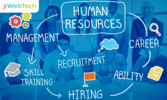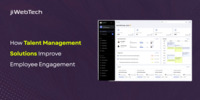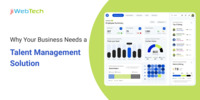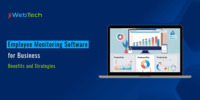- Sep 19, 2024
- Talent Management
- 2571
Share this post on:
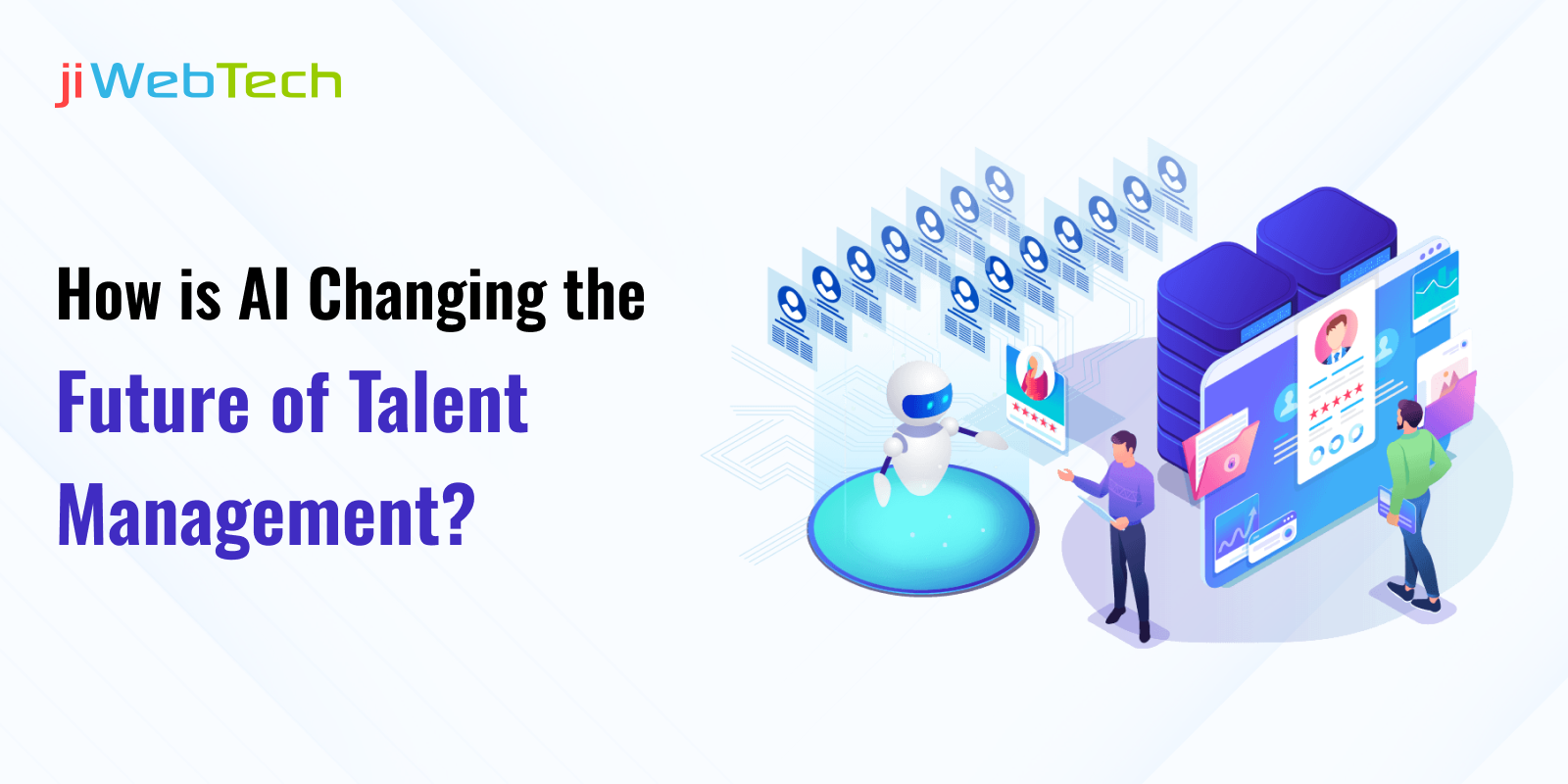
Business environments of today are fast changing and companies are always looking for creative approaches to be ahead of the curve. Talent management is one sector that has underwent notable change recently. Companies are now using innovative technologies driven by artificial intelligence (AI) to transform their attraction, development, and retention of elite personnel. The great influence of artificial intelligence on talent management as well as how it is redefining human resources going forward is investigated in this paper.
The Evolution of Talent Management Solutions
Traditionally, talent management has been a labor-intensive process, relying heavily on human judgement and manual data analysis. However, the emergence of AI-powered talent management solutions has dramatically altered this landscape. The best talent management software now incorporates AI algorithms to streamline processes, improve decision-making, and enhance the overall employee experience.
As organizations strive to find the top talent management software, they're increasingly turning to AI-driven platforms that offer comprehensive solutions for recruitment, performance management, learning and development, and succession planning. These advanced talent management apps are not just tools but strategic assets that help companies navigate the complexities of the modern workforce.
Benefits of AI in Talent Management
In this section, we will explore the myriad benefits of AI in talent management and how it's reshaping the future of human resources.
Enhanced Recruitment: One of the most significant impacts of AI in talent management is its ability to streamline and improve the recruitment process. AI-powered algorithms can quickly scan through thousands of resumes, identifying the most qualified candidates based on predefined criteria. This not only saves time for HR professionals but also helps eliminate unconscious bias in the initial screening stages.
AI chatbots are increasingly being used to engage with potential candidates, answering their questions and providing information about job openings 24/7. These chatbots can also conduct initial interviews, asking standardized questions and analyzing responses to gauge a candidate's suitability for a role. Furthermore, AI can help predict a candidate's potential success in a role by analyzing various data points, including work history, skills, and even social media presence. This predictive analysis can lead to better hiring decisions and reduced turnover rates.
Personalized Employee Development: AI is transforming the way organizations approach employee development and training. By analyzing an employee's skills, performance data, and career aspirations, AI can create personalized learning paths tailored to each individual's needs and goals. Adaptive learning platforms powered by AI can adjust the difficulty and content of training materials based on an employee's progress and comprehension. This ensures that each employee receives the most relevant and effective training, maximizing their learning potential and job performance.
AI can also recommend career paths and growth opportunities within the organization based on an employee's skills and interests. This not only helps with retention but also enables better succession planning and internal mobility.
Improved Performance Management: Traditional annual performance reviews are becoming obsolete, thanks to AI-driven continuous performance management systems. These systems can collect and analyze data from various sources, including peer feedback, project outcomes, and productivity metrics, to provide a more comprehensive and real-time view of an employee's performance.
AI algorithms can identify patterns and trends in performance data, helping managers spot potential issues early and provide timely interventions. This proactive approach to performance management can lead to increased employee engagement and productivity.
Enhanced Employee Engagement and Retention: AI-powered sentiment analysis tools can help organizations gauge employee satisfaction and engagement levels by analyzing communication patterns, survey responses, and even facial expressions in video meetings. This allows HR teams to identify potential issues and take corrective actions before they escalate.
Chatbots and virtual assistants can provide employees with instant access to HR-related information, such as benefits, policies, and vacation balances. This improves the overall employee experience and reduces the workload on HR staff.
Workforce Planning and Analytics: AI's predictive capabilities shine in workforce planning and analytics. By analyzing historical data, market trends, and business forecasts, AI can help organizations anticipate future talent needs and skill gaps. These insights enable HR teams to make data-driven decisions about hiring, upskilling, and resource allocation. AI can also simulate various scenarios, helping organizations plan for different business outcomes and their impact on workforce requirements.
Diversity and Inclusion Initiatives: AI can play a crucial role in promoting diversity and inclusion in the workplace. By analyzing job descriptions and recruitment processes, AI tools can identify and suggest changes to language that may discourage certain groups from applying. Furthermore, AI can help track diversity metrics across the organization, identifying areas where improvement is needed and suggesting targeted initiatives to address these gaps.
Automated Administrative Tasks: One of the most immediate benefits of AI in talent management is the automation of time-consuming administrative tasks. From scheduling interviews to processing payroll and managing employee records, AI can handle a wide range of routine HR tasks with greater efficiency and accuracy than manual processing. This automation frees up HR professionals to focus on more strategic, high-value activities that require human judgement and interpersonal skills.
Improved Decision-Making: AI's ability to process and analyze vast amounts of data provides HR leaders with valuable insights for strategic decision-making. From identifying the most effective recruitment channels to optimizing compensation packages, AI can provide data-backed recommendations that lead to better outcomes. Moreover, AI can help identify patterns and correlations that humans might miss, leading to new insights about what drives employee performance and satisfaction.
Also Read: The Power of AI in Human Resource Management: Enhancing Accuracy and Productivity
AI-driven Talent Management Processes
Let's move forward in the blog and explore the key AI-driven talent management processes that are defining the future of work.
Intelligent Recruitment: AI has dramatically altered the recruitment landscape. Intelligent algorithms now sift through thousands of resumes in seconds, identifying the most suitable candidates based on predefined criteria. This not only saves time but also reduces human bias in the initial screening process. AI-powered chatbots engage with potential candidates 24/7, answering queries and even conducting preliminary interviews. These bots use natural language processing to understand and respond to candidates' questions, providing a seamless experience. Furthermore, AI tools can analyze candidate data from various sources, including social media profiles and online portfolios, to create comprehensive applicant profiles. This holistic view helps recruiters make more informed decisions.
Predictive Hiring: Gone are the days of relying solely on gut feelings in hiring decisions. AI now offers predictive analytics to forecast a candidate's potential success in a role. By analyzing historical data on successful employees, AI can identify patterns and traits that correlate with high performance. These predictive models consider various factors, including skills, experience, personality traits, and even cultural fit. The result is a data-driven approach to hiring that improves the quality of hires and reduces turnover rates.
Personalized Onboarding: First impressions matter, and AI is ensuring that new hires have a smooth and personalized onboarding experience. AI-driven onboarding platforms can tailor the process to each individual, providing customized information and training based on the employee's role, experience, and learning style. These systems can track an employee's progress through the onboarding process, automatically assigning tasks and providing resources as needed. This ensures that no crucial information is missed and that new hires feel supported from day one.
Continuous Performance Management: The annual performance review is becoming obsolete, replaced by AI-powered continuous performance management systems. These platforms collect data from various sources—peer feedback, project outcomes, productivity metrics—to provide a real-time view of employee performance. AI algorithms can identify performance trends, flagging potential issues before they become problems. This allows managers to provide timely feedback and support, fostering a culture of continuous improvement.
Personalized Learning and Development: AI is revolutionizing employee training and development. By analyzing an employee's skills, performance data, and career aspirations, AI can create personalized learning paths tailored to individual needs and organizational goals. Adaptive learning platforms adjust the difficulty and content of training materials based on the learner's progress and comprehension. This ensures that each employee receives the most relevant and effective training possible, maximizing their learning potential and job performance.
Succession Planning and Internal Mobility: AI is making succession planning more strategic and data-driven. By analyzing employee performance, skills, and potential, AI can identify suitable candidates for leadership roles and create development plans to prepare them for future positions. Moreover, AI can match employees' skills and career aspirations with internal job openings, promoting internal mobility. This not only aids in retention but also ensures that the organization is making the most of its existing talent pool.
Employee Engagement and Sentiment Analysis: Understanding and improving employee engagement is crucial for retention and productivity. AI-powered sentiment analysis tools can gauge employee satisfaction by analyzing communication patterns, survey responses, and even facial expressions in video meetings. These insights allow HR teams to identify potential issues early and take proactive measures to improve employee engagement. AI can also predict flight risks, enabling organizations to intervene before valuable employees decide to leave.
Also Read: Pillars Of An End-to-end Talent Management Solution
Challenges and Considerations
While the future of AI in talent management is promising, there are several challenges that organizations need to address:
1. Data Privacy and Security
As talent management systems collect and analyze vast amounts of employee data, ensuring data privacy and security becomes paramount. Organizations must implement robust data protection measures and comply with evolving regulations.
2. Ethical Use of AI
Companies must ensure that AI-driven talent management processes are fair, transparent, and free from bias. Regular audits and diverse AI development teams are essential to mitigate potential ethical issues.
3. Change Management
Implementing AI-powered talent management solutions requires significant changes to existing processes and mindsets. Organizations need to invest in change management strategies to ensure successful adoption.
4. Upskilling HR Professionals
As AI takes over routine tasks, HR professionals need to develop new skills to work alongside AI systems effectively. This includes data analysis, strategic thinking, and an understanding of AI principles.
5. Balancing Technology and Human Touch
While AI can enhance many aspects of talent management, it's crucial to maintain a balance between technological efficiency and the human elements of HR, such as empathy and emotional intelligence.
Conclusion:
As we look to the future, it's clear that AI will continue to play an increasingly significant role in shaping talent management practices. The best talent management software and apps will leverage AI to provide more personalized, efficient, and effective solutions for organizations of all sizes.
For companies seeking to stay competitive in the war for talent, partnering with a leading software solutions provider or app development firm specializing in AI-driven talent management tools will be crucial. These partnerships will enable organizations to harness the full potential of AI, transform their talent management processes and drive better business outcomes.
So, if you are looking for AI-powered talent management solutions, look no further than jiWebTech’s Talent Management Solutions. Invest in our solution and change the trajectory of your business.





